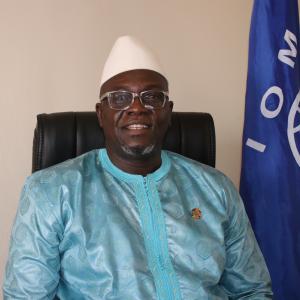Statement at Mpox Stakeholders Meeting
The meeting was convened by the Ministry of Health as part of coordination of the Mpox response in Uganda
Honourable Ministers,
Partners in Health,
Ambassadors and all Development partners present,
UN Heads of Agencies and Colleagues,
Civil Society Organizations,
Distinguished Guests,
Ladies and Gentlemen
I stand before you today as the Acting Resident Coordination, in the absence of our Resident Coordinator, Ms. Susan Ngongi Namondo, who is out of the country attending important events linked the UN work in Uganda. She would like me to impress on the deep sense of urgency and solidarity from all of us as we confront a public health challenge, not for the first or second time in her time here but the third if not fourth. However, this requires all our combined strength and resolve to combat the ongoing outbreak of Mpox in Uganda.
Our thoughts are, first and foremost, with the individuals, families, and communities affected by this outbreak. Every infection is not just a statistic; it represents a person—a life potentially at risk, a family in distress, and a community under strain. This is why, as we gather here today, it is essential to reaffirm our commitment to leave no one behind, as we unite our efforts to protect and support the health and well-being of all Ugandans.
Uganda has shown remarkable resilience in dealing with past health crises, from previous Ebola outbreaks to the recent battle against COVID-19. Yet, the emergence of Mpox presents a new challenge, and the numbers we are seeing are a stark reminder of the work that lies ahead.
As of 13 October 2024, WHO have reported 105 confirmed cases of Mpox across twelve (12) districts in Uganda. Fortunately, we have recorded 49 recoveries and nom loss of life to the outbreak. I congratulate the Government of Uganda for this huge milestone. These numbers are more than just data points—they underscore the need for swift action, comprehensive surveillance, and equitable healthcare access for all.
The Government of Uganda, under the leadership of the Ministry of Health, has responded swiftly, mobilizing resources, deploying healthcare workers, and strengthening case surveillance systems. We commend the government's decisive actions to contain the outbreak, including the establishment of rapid response teams and the engagement of community health workers at the grassroots level.
However, while these efforts are commendable, we know that much more needs to be done to bring this outbreak under control and protect the most vulnerable among us.
- Strengthening Surveillance and Reporting: Effective surveillance is the cornerstone of epidemic control. The Ministry of Health has made significant strides, but we need to expand our capacity for real-time data collection and reporting, particularly in hard-to-reach areas and among vulnerable populations. This will enable early detection of cases and a faster response to new outbreaks.
- Community Engagement and Awareness: Mpox, like many other health threats, can spread rapidly in communities without proper knowledge and awareness. It is critical that we ramp up our community engagement efforts to ensure that accurate information about Mpox symptoms, prevention, and care is reaching every village and household in Uganda. Community health workers, religious leaders, and local government officials must continue to be at the forefront of these efforts.
- Vaccination and Treatment Access: The development and deployment of vaccines and treatments are key to controlling Mpox. We urge the global health community and partners to work with Uganda to ensure that vaccines and medical supplies are available, affordable, and accessible to those who need them the most—especially in rural areas and among high-risk groups.
The fight against Mpox is not one we can win alone. It requires the collective efforts of all partners—governments, multilateral organizations, civil society, and the private sector. I call upon our international partners to support Uganda's response efforts, not only through funding but also by sharing expertise, providing technical assistance, and delivering the critical resources needed to halt the spread of this disease.
The United Nations in Uganda through WHO and UNICEF has so far mobilized over two point three (2.3) million US Dollars mostly from USAID and UN internal core resources to support different pillars of the response. However, this is not enough to end the current outbreak. The Ministry of Health has developed a six point five (6.5) million US Dollars response plan which needs resources to be fully implemented. The united Nations calls on all development partners to join hands in the fight against Mpox by support this response plan. The UN will continue to mobilize its resources, knowledge, and networks to complement Uganda's response, ensuring that no one is left behind in this critical moment, and we count on all of you to do likewise.
Distinguished Guests, Ladies and Gentlemen,
While the path ahead is challenging, it is not insurmountable. Uganda has overcome great health challenges before, and with the right investments, partnerships, and community engagement, we will overcome Mpox too.
Let us move forward with a shared sense of responsibility—knowing that the health and well-being of every Ugandan depends on the actions we take today. Together, we can protect lives, safeguard our communities, and build a healthier, more resilient Uganda.
Thank you.
Speech by


